Mathematics

Farewell to Mrs Ruthven
The Mathematics staff and the wider Mater Dei Catholic College Community would like to take this opportunity to thank Mrs Sharon Ruthven for her time at the College. In her two years with us, she has demonstrated a strong willingness to support the learning of her students and been enthusiastic in supporting initiatives that align with our improvement agenda.
Mrs Ruthven is making a move to the Sunshine State. We would like to congratulate her for securing a leadership role in her new school in Brisbane. We again thank her for her work and wish her all the best for her new endeavors.
Timetables for Year 11
Year 11 Standard Mathematics students have recently been given some guidance around the importance of creating a study timetable. As they have now begun their senior studies, it is essential that they take the time to think about what they want to achieve and make some plans to assist them to get there.
A study timetable is one way for students to organise their time. One of the hardest things about being a student isn't necessarily the actual work they will be doing, but rather finding the time to DO that work. It is an expectation from the College that Stage 6 students (Years 11 & 12) should spend anywhere from 12-15 hours a week studying across all of their subjects.
The two key messages to students when creating their timetable are:
- Life is busy and many students have commitments away from school and this is understood, as a result if plans change so should your study timetable. It is not a set and forget type of system. It will need to be reviewed, updated or changed to suit your changing situations.
- It needs to be realistic and encompass all aspects of your daily lives.
Steps to create a plan
1. Assess your current schedule. A good starting point is to assess how you currently spend your time. This will help identify how much time is available for study. You might also find activities that waste time and can be cut.
2. Construct a timetable. To prepare a timetable, start by blocking out times where there are commitments. Then you can start allocating time for important things, including your course. Your timetable needs to leave room for extra study (in case you need it) and, of course, time for yourself.
3. Set study goals. You can do this formally or just spend some time thinking about it. Good students set long term and short term goals. A longer term goal might be to complete all exercises before entering an exam period. A short term goal might be to work solidly for the next hour before you take a break.
4. Establish good habits. A study plan works best if it is followed consistently. It helps to start well early on and build great habits. These help carry you through during any periods when you might be busy, tired or just down on motivation.
Maths Pathway Introduction (Year 7,8 and 9.1 and 10.1)
Students in Maths Pathway have recently started accessing modules after beginning the year with introductory activities aimed at increasing their knowledge and skills in the areas of:
- Setting up Working Habits - This went into how to set up their workbook and Learning Logs so that their work is clear, succinct and able to be used for revision purposes.
- Growth Mindset - Ways in which learners are able to shape the way they think about themselves and their own learning to get the most out of every lesson.
- Effective ways of Seeking Help - One aspect of the program is the ‘3 Before Me’ principle and this looks at developing the habits of a self regulating learner.
Mr Kurt McPherson | Mathematics KLA Leader








